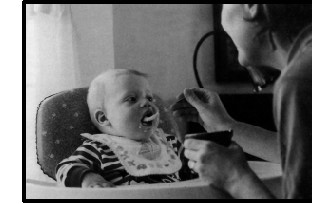
|

|

|

|
| |
 |
|
|
That well-worn feminist slogan "the personal is political" has taken on a new, exclusive meaning in the past several years. The personal, it seems, is all that's political anymore. Feminism--on college campuses, in the media and even in Washington--has become overwhelmingly personal at the expense of political action. While the economic chasm between rich and poor widens, why have many feminist sources repeatedly trumpeted Monica and masturbation, confessionals, Kegel exercises and Courtney Love? The one big feminist political issue of the '90s was abortion. Feminists have obsessed over Roe v. Wade and championed Clinton and Gore for defending the right to choose. But at the same time, most women in this country have watched their ability to obtain an abortion disappear. As Miranda Kennedy points out in "Access Denied," 85 percent of counties nationwide have no abortion provider. It's still true that women with money can always access abortion, but women with less cannot. From health care to the workplace, one important question has been lost: What about women who still lack the basic rights middle- and upper-class women now take for granted? In this issue, In These Times looks at a few of the problems facing those left behind in the feminist revolution. As Barbara Ehrenreich wrote last year in these pages, "While middle-class women gained MBAs, working-class women won the right to not be called 'honey'--and not a whole lot more than that." It's time to move on to a "fourth wave" of feminism. It's goal should be to close the class gap and extend feminism's gains to all women. Old-time "women's lib" feminists and my generation's riot grrrls need to get busy and get radical. Instead of sticking up for politicians, we need to get in their faces and demand greater economic equality and, in turn, greater freedom for all women. Kristin Kolb-Angelbeck
I just turned 30 and, as you can imagine, I've been damn busy. 30. It's the perfect time to do ... everything. In Letters to a Young Feminist, Phyllis Chesler warns readers not to marry before the age of 30. My best friend in high school used to insist that at 35, an unmarried woman qualified as an "old maid." So it's the perfect time to get hitched. Gail Sheehy suggests that our thirties are the time to get serious about our careers. The
If Americans are taking longer to grow up and longer to die, how come I'm supposed to pack an entire lifetime into five years? Because of the way our educational institutions, workplaces and cultural ideals about the family are arranged, the ideal childbearing age happens to coincide with the years most important to building a career. How are women trying to change all of this? I recently asked a group of mama-friends about this. But their responses made me feel like a jerk for asking. "How are we trying to change this? How are we trying to survive it is more the question," my friend Sarah, a teacher and single mother of two, fired back. "I bloody well have too much to do. I feel like I'm living three lives at once. What would be the ideal age to do all of this? As long as society attempts to segregate mothers and children from the privileged everybody else, any age is an age when a mother will be isolated from what has been her life, from other mothers, from working and thinking, from the practical things we do to stay sane." We fantasize about flex-time, a salary during early motherhood, a new culture in which it is understood that we have time to do it all at our own pace. But changing the world ends up on our to-do lists right after asking for a raise and finishing the laundry. Single moms like Sarah and me get occasional props for our plight. "I don't know how you do it," people say with an air of pity. But one of the better-kept secrets in maternal circles is that married moms are pretty well screwed too. The stinging reality is that the lifestyle a one-breadwinner family could once afford now requires two salaries to keep up. "In most of the committed-relationship-with-children households I know--mine included--both partners must work in order to get by," says my friend Alex. "For us, with four kids and three jobs between us, that means time is a jealously guarded commodity, adrenaline is a food group, and patience is virtually non-existent." Most of us have nearly a hundred years here--time enough to do everything we choose. Retirement and college years are accepted as periods in our lives when we need extra financial help. But in post-welfare-reform America, we can only dream of the European-style mothers' pensions. Instead we take a pay cut and try to swallow our indignation. "Two months after I accepted my first quasi-managerial job at age 30, the culmination of three years in my field, I found out I was pregnant," my friend Erin tells me. "The last two months of my pregnancy, I had insulin-dependent gestational diabetes and two to four medical appointments a week. Even though the corporation was on Working Mother's 'Best Companies To Work For' list, the absences didn't go over well. So when my leave was over, I didn't go back." Making a workplace mother-friendly can be costly, but the truth is that most employers don't even bother to crunch the numbers. I've worked for one Internet start-up and visited many others where they have batting cages, free gourmet snack bars and on-site pet care for their "mascots." "Where's the childcare?" I ask. "Uh, no one's ever requested it," I've heard more than once. And maybe they haven't. It's a rare mother who isn't woefully lacking in a sense of entitlement. But even when we ask for what we need, we tend to get a lot of shit. Children are seen as luxury items or as annoying little rugrats to be kept out of other people's hair. "So long as people have this idea that children are some sort of disease-ridden vermin to be kept segregated in schools and daycares and other people's homes, mothers, no matter what our ages, find ourselves alone," Sarah laments. I wish she were wrong. Here's a conversation I had with my 10-year-old daughter Maia recently: "I feel like you do too many jobs," she said "I do do too many jobs," I replied. "I know. That's what I feel." "What are we going to do about it?" "I don't know. Maybe I can help you with some of the stuff. Like dishes. I like doing dishes." "Cool." Then, one week later, while doing the dishes, she said: "I feel like we do too many jobs." "We do do too many jobs." "I know. That's what I feel." "What are we going to do about it?" "I don't know. Maybe we can eat out more often." In the spirit of "what are we going to do about it?" I asked some mamas to weigh in with their top agenda items for the mama-revolution. Here are the highlights: Inga: "First and foremost, we need women to band together around the concept that all mothers are working mothers! We've let them pit us against each other--it's the ol' 'divide and conquer' thing. We need to take responsibility for ourselves, each other and each other's children." Monika: "Mamas who bust butt and stay home need to be considered just as valuable as those who bust butt and work outside the home." Anne: "We need high-quality, affordable daycare now. Daycare includes: infant care, toddler care, preschool, elementary school (with after-school programs), middle school (with after-school programs) and high school (with, you guessed it, after-school programs). This is my No. 1 source of anxiety as a parent." Jennifer: "We need sane gun control laws." Dana: "Mamas working outside the home should get subsidized for our daycare/educational solution of choice--meaning $12,000 per year for the grandmama, neighbor or home-school co-op, plus $2,500 per year for artistic/passionate pursuits. Any man or woman who chooses to stay home from a successful or imagined career in order to take care of the babes gets $35,000 per year and a relief allowance for periodic reprieve. It's time we admitted that going it alone is a burnout job just like police work and fire fighting: Mamas should get full retirement after 20 years of service." Laura: "Survival. We all need food, shelter, health care and clothing. We must do whatever it takes to ensure that no child goes hungry, no matter whose toes get stepped on." Sierra: "Diapers cost too much. HMOs suck. Teen mothers and welfare mothers are demonized as witches. Apathy and frustration are hard to avoid--but avoid them! Stage public nurse-ins every place where feeding our babies is considered 'obscene.' Demand child- and family-friendly environments everywhere." Nanci: "What we need is true sharing of the roles of parenting if there is a partner involved. No more glorifying Dad or partner for taking the kids on a 'special outing.' True equality." Doni-Marie: "We need to make motherhood a hot topic--the issue of the species. Otherwise we'll just have to go on a breeding strike. We have to muster up some self-respect and gain some visibility. We need to be the bold new role models of motherhood beyond Betty Crocker and Super Career Mom." And that is the maternal feminist agenda. It's wide open for additions and adaptations. The important thing is to be gentle with yourself and with your family so that we can all live soulfully in this incomplete revolution--saving the rage to fuel social transformation. Look at all of the energy we spend beating ourselves up for our failure to adjust to this insane world where mothers work double shifts and shoulder the blame for everything from their children's bad behavior to global economic crises. Now imagine we turned that energy outward and used to it make this world our home. I'm sometimes asked, "Can't you feminists come up with a new schtick?"
Sure. As soon as we have a salary for motherhood, the end of age
and sex discrimination in the workplace, the Equal Rights Amendment,
and on-site childcare at all schools and places of employment. As
soon as having kids at 15 or 45 are life-choices, not reproductive
prisons and economic necessities--as soon as all that happens, I'll
write an entirely different essay. Ariel Gore is the editor of Hip Mama, and the author of The Hip Mama Survival Guide and The Mother Trip.
|

